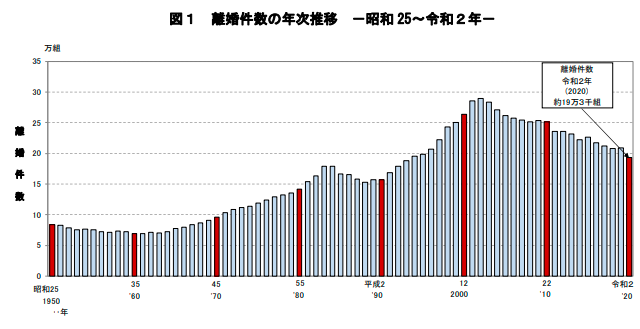ライフハックとしてではなく、英語学習にも極めて有用なのが、著名人が10分程度のプレゼンを行うTEDです。
TED Talksとは、あらゆる分野のエキスパートたちによるプレゼンテーションを無料で視聴できる動画配信サービスのことです。10年ほど前にサービスが開始されてから、政治、心理学、経済、日常生活などの幅広いコンテンツが視聴できることから人気を集めています。
RareJob English Lab
TEDは4000を超える膨大な数の動画があります。しかし慣れないうちは、動画の探し方や視聴のコツが分かりませんよね。この記事では、数多くのTEDを見てきた管理人(塩@saltandshio)が、心を揺さぶられたトークをあらすじと一緒にご紹介します。
ビジネス英会話を効率よく身につけたい方におすすめスクール
シェーン英会話
シェーンは1977年の創業以来、ネイティブ講師が英語を英語で教える「直接教授法」を採用しています。首都圏におけるスクール拠点数は、ネイティブ講師の英会話スクールでNo.1。駅から近いスクールが多いので通いやすく時間を有効に使えます。
スピークバディ パーソナルコーチング
1日1時間の短期集中トレーニングで、あなたの英語力向上をコーチが全力でサポートします。あなたの英語の世界が、劇的に変わります。
ダン・ギルバート:未来の自分に対する心理
「人間というのは未完成のくせに、自分たちは完成したと勘違いしているものだ。」ダン・ギルバートが紹介するのは、彼が「歴史の終わり幻想」と呼ぶ現象についての最近の研究です。将来の自分は、ずっと今の自分のままだろうと想像してしまう現象です。(でもそうは行きません)(約6分半)。Dan Gilbert / The psychology of your future self.
[PR]無料体験レッスン実施中!全国208校、創業40年の老舗英会話スクール【シェーン英会話】なぜ私たちは将来的に後悔する選択をするのか
厚生労働省が2022年8月に発表した「令和4年度 離婚に関する統計の概況」によると、平成14年に約29万組とピークを迎えた離婚も、平成15年以降は減少傾向が続いており、令和2年は約19万3千組となっています。

私たちは、人生のどの段階においても、その後の人生に大きく影響を及ぼす決断をします。しかし、いざ「その後」になってみると、私たちは「どうしてそうしてしまったのか」「あのまま続けていたら」「あっちのほうを選んでいれば」と過去の自分の決断を悔やむものです。
だから若者は10代の頃に大枚はたいて彫ったタトゥーを、また大枚はたいて除去します。中高年が離婚を急ぐ相手は、若い頃に結婚を急いだ相手です。高齢者が懸命に減らそうとしているのは、中年の頃に懸命に増やそうとしたものです。
ずっと同じパターンです。
So young people pay good money to get tattoos removed that teenagers paid good money to get. Middle-aged people rushed to divorce people who young adults rushed to marry. Older adults work hard to lose what middle-aged adults worked hard to gain.
On and on and on.
なぜ未来の自分が後悔する決断を下すのかという疑問は、多くの心理学者の研究対象になり、また長きにわたり心理学者を虜にしてきました。研究の結果わかったのは、「時間の持つ力について、私たちが根本的に思い違いをしている」ということでした。では、くわしく見ていきましょう。
[PR]まずは無料カウンセリング”続けるため”の オンライン英語コーチ「スピークバディ パーソナルコーチング」人はいつから時間の流れを早く感じるようになるのか
赤ちゃんの成長が細胞レベルで早いのは、皆さんご存知のとおりです。歳を重ねるごとに成長は緩やかなものになり、秒単位から年単位へと変化していきます。そもそも時間の流れとはなんでしょうか。時計メーカーのSeikoでさえ時間の流れを「なかなか一概には説明しきれません」と紹介しています。
「時間」という言葉は、一般的には、「時の流れのある一瞬の時刻」、あるいは、「ある時刻とある時刻の間の長さ」の意味で使われています。
時間とは何か / セイコーミュージアムより
ただし、「時間とは何か」といざ問われると、このテーマには、心理学・生物学・哲学・自然科学・物理学・宇宙論など、それぞれの分野の切り口があり、また、その時代によっても、多くの定義や考え方があるので、なかなか一概には説明しきれません。
この、人生における不思議な時の流れの変化は、何歳の時に起きるのでしょうか。その分岐点はどこなのでしょう。
その答えは、何とほとんどの人にとって「今」です。どんな時も「今」なのです。
The answer, it turns out, for most people, is now, wherever now happens to be.
ここで大切なことをお伝えしましょう。私たちは、じつは常にある錯覚を抱えながら過ごしています。その錯覚とは、自分の過去……つまり自分の「歴史」がこの瞬間に終わり、ずっとなるはずだった未来(本当)の自分に最近なったばかりで、残りの人生はこのままの自分がずっと続いていくという錯覚です。
なぜ、私たちはいまの自分がこれからもずっと続くと思ってしまうのでしょうか。

多くの人が抱える勘違い
私たちは他にもある勘違いを抱えて生きています。その勘違いとは時間の流れの変化です。むかしの事を思い出してください。過去の10年間を振り返ってみると、その時間はあっという間に過ぎたと感じるでしょう。しかし、これからの10年は途方もなく長く感じるものです。このことから、この先10年の変化は緩やかに起きるはずだと、多くの人が勘違いをしているのです。
データによると18~68歳の、どの年齢でも今後10年間で経験する変化を、大幅に少なく見積もりました。これを「歴史の終わり幻想」と呼んでいます。
At every age, from 18 to 68 in our data set, people vastly underestimated how much change they would experience over the next 10 years. We call this the “end of history” illusion.
10年前の価値観と、いまの価値観がおなじな人はどれくらいでしょうか。10年前に好きだった芸能人をいまでも好きですか?その時に来ていた服や、化粧はいまも出来るでしょうか。また、体質や肌質も変化し、髪の毛には白髪が予想よりも多く混じっている人もいるのではないでしょうか。
心理学者が「歴史の終わり幻想」と呼んでいるものは、まさにこのことです。今後10年間で自分の性格がどれくらい変わるか、どの年齢でも少なく見積もっているのです。

大体の人は将来を楽観視している
小さく見積もっているのは、価値観や性格のように一過性のものだけではありません。好き嫌いや、味付けや服や人の好みについても、私たちは自分たちの変化を小さく見積もっています。
ひとつ例を挙げましょう。研究者が被験者に対し、「好きなアーティストが10年後にコンサートをしたとして、どれくらいチケット代金を払えますか?」という質問をしました。多くの人は平均して129ドル出せると言いましたが、今度は別の被験者に「10年前に好きだったアーティストがコンサートをするので、あなたはいくら出せますか?」と質問したところ、その答えはなんと80ドルだったのです。
理屈どおりに行けば、両者は同額になるはずですが、私たちは不変性を多く見積るために、現在の好みを満たす可能性にお金を出しすぎてしまうのです。
Now, in a perfectly rational world, these should be the same number, but we overpay for the opportunity to indulge our current preferences because we overestimate their stability.
なぜ、50ドルもの差が出るのかはわかりませんが、おそらく思い出す容易さと想像する難しさの相対的な差が関係しているといわれています。過去の検証は出来ても、これから先を見据えるのは難しいということです。だからといって、想像力が欠如しているだけで、思い描いた未来が起きないというわけではありません。
ただ、時間というのはわたしたちが思っている以上に強固の存在であると言う事です。

まとめ:人生は常に変化している
いまの自分と10年前の自分が違うことは、一番自分自身が自覚しているのではないでしょうか。やっている勉強や仕事だけでなく、趣味や価値観に至るまで、好みというものは思いのほか変わっているものです。しかし、残念なことにその変化に気が付くのはだいぶあとになってからなのです。
ほとんどの人にとって、今という時はまるで魔法の時なのです。
タイムライン上の分岐点なのです。それは、私たちが最終的に自分自身になる瞬間なのです。
It’s as if, for most of us, the present is a magic time.
It’s a watershed on the timeline. It’s the moment at which we finally become ourselves.
しかし、人はなぜか未完成である自分を、完成した存在であると勘違いしています。時間と同じように、わたしたちも常に変化をしているのです。いまのあなたも、過去のあなたも、どのあなたも束の間の儚い存在であることを忘れてはいけません。
人生において変わらないのは、「変わる」ということだけなのです
The one constant in our life is change.
「明日から」「次こそは」「今度は」となにかと言い訳をつけて、やらなければいけないことを後回しにしていませんか?未来の自分のために、変わるのは「いま」この瞬間かもしれません。

英語全文
At every stage of our lives we make decisions that will profoundly influence the lives of the people we’re going to become, and then when we become those people, we’re not always thrilled with the decisions we made.
<全文を読む>▼クリック▼
Now, I think one of the reasons — I’ll try to convince you today — is that we have a fundamental misconception about the power of time. Every one of you knows that the rate of change slows over the human lifespan, that your children seem to change by the minute but your parents seem to change by the year. But what is the name of this magical point in life where change suddenly goes from a gallop to a crawl? Is it teenage years? Is it middle age? Is it old age? The answer, it turns out, for most people, is now, wherever now happens to be. What I want to convince you today is that all of us are walking around with an illusion, an illusion that history, our personal history, has just come to an end, that we have just recently become the people that we were always meant to be and will be for the rest of our lives.
Let me give you some data to back up that claim. So here’s a study of change in people’s personal values over time. Here’s three values. Everybody here holds all of them, but you probably know that as you grow, as you age, the balance of these values shifts. So how does it do so? Well, we asked thousands of people. We asked half of them to predict for us how much their values would change in the next 10 years, and the others to tell us how much their values had changed in the last 10 years. And this enabled us to do a really interesting kind of analysis, because it allowed us to compare the predictions of people, say, 18 years old, to the reports of people who were 28, and to do that kind of analysis throughout the lifespan.
Here’s what we found. First of all, you are right, change does slow down as we age, but second, you’re wrong, because it doesn’t slow nearly as much as we think. At every age, from 18 to 68 in our data set, people vastly underestimated how much change they would experience over the next 10 years. We call this the “end of history” illusion. To give you an idea of the magnitude of this effect, you can connect these two lines, and what you see here is that 18-year-olds anticipate changing only as much as 50-year-olds actually do.
Now it’s not just values. It’s all sorts of other things. For example, personality. Many of you know that psychologists now claim that there are five fundamental dimensions of personality: neuroticism, openness to experience, agreeableness, extraversion, and conscientiousness. Again, we asked people how much they expected to change over the next 10 years, and also how much they had changed over the last 10 years, and what we found, well, you’re going to get used to seeing this diagram over and over, because once again the rate of change does slow as we age, but at every age, people underestimate how much their personalities will change in the next decade.
And it isn’t just ephemeral things like values and personality. You can ask people about their likes and dislikes, their basic preferences. For example, name your best friend, your favorite kind of vacation, what’s your favorite hobby, what’s your favorite kind of music. People can name these things. We ask half of them to tell us, “Do you think that that will change over the next 10 years?” and half of them to tell us, “Did that change over the last 10 years?” And what we find, well, you’ve seen it twice now, and here it is again: people predict that the friend they have now is the friend they’ll have in 10 years, the vacation they most enjoy now is the one they’ll enjoy in 10 years, and yet, people who are 10 years older all say, “Eh, you know, that’s really changed.”
Does any of this matter? Is this just a form of mis-prediction that doesn’t have consequences? No, it matters quite a bit, and I’ll give you an example of why. It bedevils our decision-making in important ways. Bring to mind right now for yourself your favorite musician today and your favorite musician 10 years ago. I put mine up on the screen to help you along. Now we asked people to predict for us, to tell us how much money they would pay right now to see their current favorite musician perform in concert 10 years from now, and on average, people said they would pay 129 dollars for that ticket. And yet, when we asked them how much they would pay to see the person who was their favorite 10 years ago perform today, they say only 80 dollars. Now, in a perfectly rational world, these should be the same number, but we overpay for the opportunity to indulge our current preferences because we overestimate their stability.
Why does this happen? We’re not entirely sure, but it probably has to do with the ease of remembering versus the difficulty of imagining. Most of us can remember who we were 10 years ago, but we find it hard to imagine who we’re going to be, and then we mistakenly think that because it’s hard to imagine, it’s not likely to happen. Sorry, when people say “I can’t imagine that,” they’re usually talking about their own lack of imagination, and not about the unlikelihood of the event that they’re describing.
The bottom line is, time is a powerful force. It transforms our preferences. It reshapes our values. It alters our personalities. We seem to appreciate this fact, but only in retrospect. Only when we look backwards do we realize how much change happens in a decade. It’s as if, for most of us, the present is a magic time. It’s a watershed on the timeline. It’s the moment at which we finally become ourselves. Human beings are works in progress that mistakenly think they’re finished. The person you are right now is as transient, as fleeting and as temporary as all the people you’ve ever been. The one constant in our life is change.
Thank you.
<閉じる>
\ ほかにも気になるトークが満載! /








